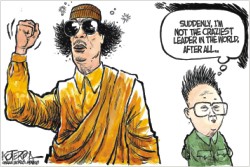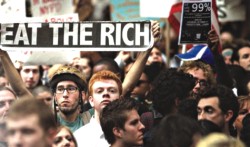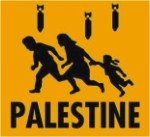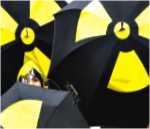Around the world in 2011
By Bareesh
A lot happened last year breaking the comfort levels of many. It showed that nothing remains the same, at least not forever. Some great powers toppled. Others were formed. These make up the events of the past and determine what happens in the future.
...........................................................................................................................
The Protestor is happening
 Time magazine named “The Protester” its person of the year in 2011. For the unnamed campaigner, so many of whom have flocked to the streets around the world, Revolution came this year. Dictators toppled as it was proven again that people can achieve anything.
Time magazine named “The Protester” its person of the year in 2011. For the unnamed campaigner, so many of whom have flocked to the streets around the world, Revolution came this year. Dictators toppled as it was proven again that people can achieve anything.
A wind of change swept through the Middle East, the breeze announcing what is now popularly termed as the Arab Spring. It began with the protests in Tunisia and the subsequent resignation of their leader of over 20 years. The Spring spread across the region claiming more victims as both the Yemeni and the Egyptian governments were forced to give up power by the masses gathering in the streets. In Syria, the struggle still continues as President Assad clings on stubbornly.
Rebecca Black is a natural disaster
 There were also natural disasters elsewhere. New Zealand was rocked with a strong earthquake early in the year, Brazil suffered bad floods and Thailand suffered worse floods. Thailand's ones were particularly ominous, with 666 people killed. Even more ominous was the creation of a “song” that went viral early this year. It was educational, teaching you the days of the week. Rebecca Black's “Friday” was the most viewed thing on YouTube ever until it was taken down. Sticking with death and destruction and sad stuff, in July, Andres Breivik, a confessed schizophrenic, ultranationalist, conservative, white supremacist or in other words, a neo-Nazi, gunned down 69 people. The man's motive was to advertise his manifesto, which consisted of the elimination of multi-culturalism, the deportation of Muslims from Europe and, well, he basically wanted to do what Hitler wanted to do… with Muslims instead of Jews.
There were also natural disasters elsewhere. New Zealand was rocked with a strong earthquake early in the year, Brazil suffered bad floods and Thailand suffered worse floods. Thailand's ones were particularly ominous, with 666 people killed. Even more ominous was the creation of a “song” that went viral early this year. It was educational, teaching you the days of the week. Rebecca Black's “Friday” was the most viewed thing on YouTube ever until it was taken down. Sticking with death and destruction and sad stuff, in July, Andres Breivik, a confessed schizophrenic, ultranationalist, conservative, white supremacist or in other words, a neo-Nazi, gunned down 69 people. The man's motive was to advertise his manifesto, which consisted of the elimination of multi-culturalism, the deportation of Muslims from Europe and, well, he basically wanted to do what Hitler wanted to do… with Muslims instead of Jews.
Royal feast
In England, the crown prince's kid who is also for some reason a prince (but then again, so is the queen's husband.), got married to a commoner girl. For some reason, this matrimony keeping alive an archaic, obsolete lineage mattered to people. That's why this is included here. People actually tuned in and watched the wedding on TV, which I've heard was very long and boring. I know this because I turned on my TV at 3 hour intervals to find the wedding still going on.
Gaddafi rises and falls
 One man was less peaceful in the face of such anarchy. Colonel Muammar Gaddafi attacked the non-violent protests and rebellion rose into civil war in Libya. After 8 months of fighting, rebel forces finally marched on the last remaining stronghold of the man who had once been a hero for deposing the monarchy in Libya. Gaddafi died in Sirte after being captured by the rebels. He had ruled Libya for 42 years.
One man was less peaceful in the face of such anarchy. Colonel Muammar Gaddafi attacked the non-violent protests and rebellion rose into civil war in Libya. After 8 months of fighting, rebel forces finally marched on the last remaining stronghold of the man who had once been a hero for deposing the monarchy in Libya. Gaddafi died in Sirte after being captured by the rebels. He had ruled Libya for 42 years.
Protests against governments were common in other parts of the world as well. In India, activist Anna Hazare started an anti-corruption campaign by going on hunger strikes in a Gandhi-esque fashion. Across Europe, frustrations led to demonstration against the ailing Eurozone. Leaders resigned in Ireland, Italy and Greece as the people demanded change. In Russia, outrage has spread and continues as the government is accused of rigging the election. Apparently 140% of the people turned up to vote. In England, riots were sparked, apparently in protest, of the killing of a 29 year old man by the police, although the violence it wreaked was hardly justifiable.
 Peacefully 99 percent
Peacefully 99 percent
The other big movement started in a place one would not have expected. In the heartland of democracy and capitalism, in Manhattan, people camped out on the street to Occupy Wall Street. The campaign had started to protest the US government giving banks bailouts instead of spending on education, healthcare and tackling unemployment. It turned out others across the world shared the sentiment as it spread like wildfire and pretty soon, the 99% occupied over 1000 cities.
Osama redux?
 The US government would have reason to rejoice though. 10 years after the horrific terrorist attacks of 9/11, in May, after a covert operation by US Special Forces, Osama Bin Laden was killed in Abottabad, near the Pakistani capital, Islamabad. The disposal of the body into an undisclosed location raised questions about the legitimacy of the news of Bin Laden's death, something conspiracy theorists are still speculating about. It's more than likely, though, that we've heard the last of Osama Bin Laden. In December, North Korea's leader Kim Jong-Il also died of a heart attack. Although the States thought they could breathe a sigh of relief at Kim's demise, his successor and son, Kim Jong-Un has stated nothing will change from his father's regime. That means nuclear projects still continue in the secretive North Korean facilities.
The US government would have reason to rejoice though. 10 years after the horrific terrorist attacks of 9/11, in May, after a covert operation by US Special Forces, Osama Bin Laden was killed in Abottabad, near the Pakistani capital, Islamabad. The disposal of the body into an undisclosed location raised questions about the legitimacy of the news of Bin Laden's death, something conspiracy theorists are still speculating about. It's more than likely, though, that we've heard the last of Osama Bin Laden. In December, North Korea's leader Kim Jong-Il also died of a heart attack. Although the States thought they could breathe a sigh of relief at Kim's demise, his successor and son, Kim Jong-Un has stated nothing will change from his father's regime. That means nuclear projects still continue in the secretive North Korean facilities.
Palestine no go
 Palestine applied for statehood at the UN this year, in what was almost an attempt made from desperation. The struggle between Palestine and Israel has gone on for God knows how long and when the US vetoed the appeal, throwing their support behind Israel, Palestine saw its dreams of independence crushed. But we did welcome the 193rd country this year when Sudan split into North and South much like Dhaka City except they got to vote for or against the decision. South Sudan is now free from war torn North which I think stays as just Sudan.
Palestine applied for statehood at the UN this year, in what was almost an attempt made from desperation. The struggle between Palestine and Israel has gone on for God knows how long and when the US vetoed the appeal, throwing their support behind Israel, Palestine saw its dreams of independence crushed. But we did welcome the 193rd country this year when Sudan split into North and South much like Dhaka City except they got to vote for or against the decision. South Sudan is now free from war torn North which I think stays as just Sudan.
Bye bye apple
There were deaths of cultural icons as usual. Steve Jobs, one of the founders of Apple, the man responsible for the creation of iPods - which meant no sensible person ever had to touch a Zune (laugh at Bill Gates) - and trademarking black turtleneck sweaters, died in October. Five-time Grammy winner Amy Winehouse died from alcohol poisoning in July. Guess she should'a gone to rehab. One of the most famous actresses of Hollywood's golden age, Elizabeth Taylor, instantly recognisable for her beauty and distinctive violet eyes, died in March. And even sadder was the death of Knut, the German polar bear that drowned to death in March. Should I facepalm or be sad?
The death of Czech revolutionary dissident and former president, Vaclav Havel was not given the attention the great man deserved. But one other revolutionary that did, was Aung San Suu Kyi. Burma's figurehead of democracy and Nobel Prize winner was finally released from the house arrest imposed on her by the military junta government.
We're 7 billion
The year held too much to fit into this article. The US forces finally left Iraq, the News of the World started a phone hacking scandal which ended in the 168 year old paper closing down. But the worst news of the year had to come in late October, on Halloween. The birth of the 7 billionth person in the world. We are estimated to hit 8 billion in 5 years. We're worse than rabbits.
This review might not be around next year. 2012 is here. Doomsday, we finally meet.
Nuclear unclear
 Nuclear scares made a comeback this year. In March, an earthquake registering 9.0 on the Richter Scale (so powerful it threw the earth of its axis by a foot) struck off the east coast of Japan causing massive tsunamis. It caused devastation that shook the world (pun not intended). It was, in the Japanese PM's words, the most difficult crisis in the 65 years since World War 2 ended. But as if the colossal damages, deaths and the rising number of homeless people wasn't enough, the Fukushima Nuclear Plant threatened to go into meltdown after damage from the tsunamis. People were evacuated from a 20km radius around the plant and fears were that this would be another Chernobyl. Thankfully, it was brought somewhat under control although the area is still quarantined.
Nuclear scares made a comeback this year. In March, an earthquake registering 9.0 on the Richter Scale (so powerful it threw the earth of its axis by a foot) struck off the east coast of Japan causing massive tsunamis. It caused devastation that shook the world (pun not intended). It was, in the Japanese PM's words, the most difficult crisis in the 65 years since World War 2 ended. But as if the colossal damages, deaths and the rising number of homeless people wasn't enough, the Fukushima Nuclear Plant threatened to go into meltdown after damage from the tsunamis. People were evacuated from a 20km radius around the plant and fears were that this would be another Chernobyl. Thankfully, it was brought somewhat under control although the area is still quarantined.
